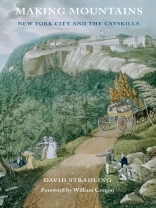For over two hundred years, the Catskill Mountains have been repeatedly and dramatically transformed by New York City. In Making Mountains, David Stradling shows the transformation of the Catskills landscape as a collaborative process, one in which local and urban hands, capital, and ideas have come together to reshape the mountains and the communities therein. This collaboration has had environmental, economic, and cultural consequences.
Early on, the Catskills were an important source of natural resources. Later, when New York City needed to expand its water supply, engineers helped direct the city toward the Catskills, claiming that the mountains offered the purest and most cost-effective waters. By the 1960s, New York had created the great reservoir and aqueduct system in the mountains that now supplies the city with 90 percent of its water.
The Catskills also served as a critical space in which the nation’s ideas about nature evolved. Stradling describes the great influence writers and artists had upon urban residents – especially the painters of the Hudson River School, whose ideal landscapes created expectations about how rural America should appear. By the mid-1800s, urban residents had turned the Catskills into an important vacation ground, and by the late 1800s, the Catskills had become one of the premiere resort regions in the nation.
In the mid-twentieth century, the older Catskill resort region was in steep decline, but the Jewish ‚Borscht Belt‘ in the southern Catskills was thriving. The automobile revitalized mountain tourism and residence, and increased the threat of suburbanization of the historic landscape. Throughout each of these significant incarnations, urban and rural residents worked in a rough collaboration, though not without conflict, to reshape the mountains and American ideas about rural landscapes and nature.
Inhaltsverzeichnis
Foreword
Preface: The Haynes Family of Haynes Hollow
Acknowledgments
Introduction: Types of the Permanent and Unchanging
1) A Natural Resource
2) Envisioning Mountains
3) The Mountain Hotels
4) Making Wilderness
5) Mountain Water
6) Moving Mountains
7) A Suburb of New York
Epilogue: Whose Woods These Are
Notes
Bibliographical Essay
Index
Über den Autor
David Stradling is associate professor of history at the University of Cincinnati. His focus is the intersection of urban and environmental history. He is author of Smokestacks and Progressives: Environmentalists, Engineers, and Air Quality in America, 1881-1951 and editor of Conservation in the Progressive Era: Classical Texts.












